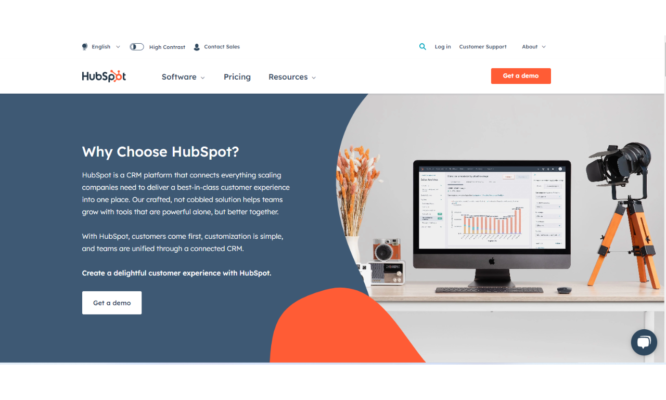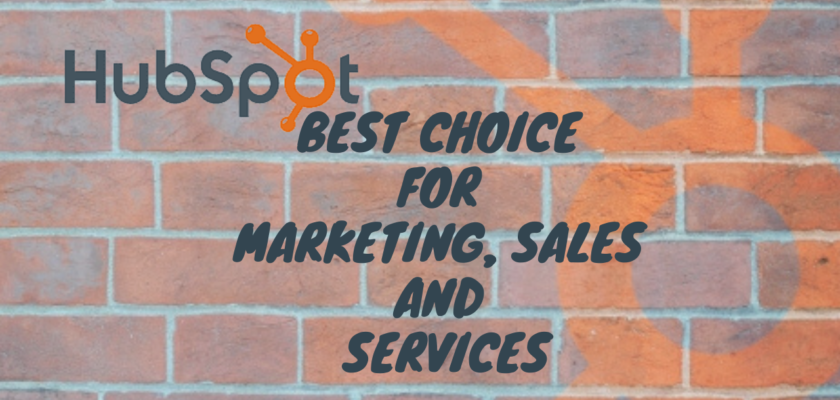Introduction
Marketing, sales, and service are the lifeblood of any business. Without effective marketing, it is difficult to attract potential customers to your brand. Without effective sales, it is difficult to convert those potential customers into paying customers. Without effective service, it is difficult to retain those paying customers and turn them into loyal brand advocates. In short, marketing, sales, and service are essential functions for any business that wants to grow and succeed.
Introduction to HubSpot

HubSpot is a leading customer relationship management (CRM) platform that offers a suite of tools to help businesses with their marketing, sales, and service needs. The platform is designed to help businesses attract, engage, and delight customers by providing them with the tools they need to create and manage marketing campaigns, track sales activities, and provide exceptional customer service.
Read more: The Ultimate Guide to HubSpot Inbound Marketing and Sales Solutions
HubSpot's Marketing Capabilities
HubSpot's inbound marketing methodology
HubSpot's inbound marketing methodology is a customer-centric approach to marketing that focuses on attracting, engaging, and delighting customers. The methodology involves creating valuable content that addresses the pain points of your target audience, promoting that content through various channels, and then using that content to generate leads and nurture those leads into customers. The goal is to create a positive customer experience that builds trust and loyalty, which in turn leads to more business and referrals.
HubSpot's marketing tools
- Website builder – HubSpot's website builder makes it easy to create a professional-looking website that is optimized for search engines and designed to convert visitors into leads. The builder includes a drag-and-drop editor, customizable templates, and the ability to add forms, calls-to-action, and other elements that help to capture leads.
- Blogging platform – HubSpot's blogging platform allows businesses to create and publish blog posts that are optimized for search engines and designed to attract and engage potential customers. The platform includes tools for keyword research, content creation, and content promotion, as well as analytics and reporting to help businesses track the success of their blog.
- Social media management – HubSpot's social media management tools allow businesses to manage and publish content across multiple social media platforms from a single dashboard. The tools include scheduling, monitoring, and reporting features, as well as the ability to track and analyze the performance of social media campaigns.
- Email marketing – HubSpot's email marketing tools allow businesses to create and send personalized email campaigns that are designed to nurture leads and convert them into customers. The tools include templates, personalization features, A/B testing, and analytics and reporting to help businesses track the success of their email campaigns.
Benefits of using HubSpot for marketing
- Integrated tools for streamlined workflows – HubSpot's marketing tools are integrated with each other, as well as with its sales and service tools, which makes it easy to create and manage campaigns across multiple channels. This integration also means that businesses can track and analyze the entire customer journey, from the initial contact to the final sale and beyond.
- Comprehensive analytics and reporting – HubSpot's marketing tools include detailed analytics and reporting features that allow businesses to track the success of their campaigns, identify areas for improvement, and make data-driven decisions. The platform includes dashboards, reports, and customizable analytics that can be tailored to specific business needs.
- Ability to personalize and target messaging – HubSpot's marketing tools allow businesses to create personalized messaging that is tailored to the needs and interests of their target audience. The platform includes tools for segmentation, personalization, and targeting, as well as the ability to create automated workflows that deliver the right message at the right time. This personalization helps to create a more positive customer experience, which in turn leads to more business and referrals.
HubSpot's Sales Capabilities
HubSpot's sales tools
- Contact management – HubSpot's contact management tools allow businesses to keep track of their leads and customers in one centralized location. The tools include features for lead capture, lead scoring, and lead nurturing, as well as the ability to segment and personalize communications with different groups of contacts.
- Deal tracking – HubSpot's deal tracking tools allow businesses to manage their sales pipeline and track the progress of deals from initial contact to close. The tools include features for deal stages, deal tracking, and forecasting, as well as the ability to assign deals to specific sales reps and track their activity.
- Sales automation – HubSpot's sales automation tools allow businesses to automate routine sales tasks, such as email follow-ups and appointment scheduling. The tools include features for email templates, email sequences, and appointment scheduling, as well as the ability to track and analyze the performance of these automated tasks.
Benefits of using HubSpot for sales
- Improved lead qualification and management – HubSpot's sales tools make it easy for businesses to qualify and manage leads, which leads to a more efficient sales process. The platform includes tools for lead scoring, lead nurturing, and lead segmentation, as well as the ability to track and analyze the performance of different lead sources.
- Enhanced sales team collaboration – HubSpot's sales tools allow businesses to collaborate more effectively with their sales team. The platform includes tools for task management, team collaboration, and deal tracking, as well as the ability to assign tasks and deals to specific team members and track their progress.
- Data-driven insights for informed decision-making – HubSpot's sales tools provide businesses with data-driven insights that can help them make informed decisions about their sales process. The platform includes detailed analytics and reporting features that allow businesses to track the performance of their sales team, identify areas for improvement, and make data-driven decisions to improve their sales process.
HubSpot's Service Capabilities
HubSpot's service tools
- Ticket management – HubSpot's ticket management tools allow businesses to manage customer inquiries and support requests from a single platform. The tools include features for ticket creation, ticket tracking, and ticket assignment, as well as the ability to prioritize tickets based on urgency and severity.
- Customer feedback – HubSpot's customer feedback tools allow businesses to gather feedback from customers and use that feedback to improve their service offerings. The tools include features for surveys, feedback forms, and customer reviews, as well as the ability to analyze and act on customer feedback.
- Knowledge base management – HubSpot's knowledge base management tools allow businesses to create and manage a repository of support articles and documentation. The tools include features for article creation, categorization, and search, as well as the ability to track article views and engagement.
Benefits of using HubSpot for service
- Improved customer satisfaction and retention – HubSpot's service tools help businesses provide a better customer experience, which leads to improved customer satisfaction and retention. The platform includes tools for personalized support, proactive communication, and customer feedback, as well as the ability to track and analyze customer satisfaction metrics.
- Enhanced support team productivity – HubSpot's service tools help businesses improve the productivity of their support team. The platform includes tools for ticket management, knowledge base management, and customer feedback, as well as the ability to automate routine support tasks and streamline workflows.
- Ability to measure and improve service performance – HubSpot's service tools provide businesses with data-driven insights that can help them measure and improve their service performance. The platform includes detailed analytics and reporting features that allow businesses to track key performance metrics, identify areas for improvement, and make data-driven decisions to improve their service offerings.
HubSpot's Integration Capabilities
HubSpot is an all-in-one platform that offers a variety of marketing, sales, and service tools. However, it also understands the importance of integration with other platforms to provide businesses with a seamless experience. HubSpot offers integrations with several popular platforms, allowing businesses to connect their HubSpot data with other business-critical tools.
HubSpot's integration with popular platforms
- Salesforce – HubSpot's integration with Salesforce allows businesses to connect their HubSpot data with their Salesforce data. This integration allows businesses to sync data between the two platforms, improving data accuracy and management, as well as automating tasks across both platforms.
- Shopify – HubSpot's integration with Shopify allows businesses to connect their e-commerce data with their HubSpot data. This integration allows businesses to track customer orders, monitor sales data, and connect customer data with their marketing and sales efforts in HubSpot.
- Microsoft Dynamics – HubSpot's integration with Microsoft Dynamics allows businesses to connect their HubSpot data with their Dynamics data. This integration allows businesses to sync data between the two platforms, improving data accuracy and management, as well as automating tasks across both platforms.
Benefits of using HubSpot's integrations
- Improved data management and accuracy – HubSpot's integrations allow businesses to connect their data across platforms, improving data accuracy and management. Integrating HubSpot with other platforms ensures that data is consistent and up-to-date across all systems.
- Streamlined workflows across platforms – HubSpot's integrations allow businesses to streamline workflows across platforms, reducing manual data entry and improving efficiency. Integrating HubSpot with other platforms ensures that data flows seamlessly between systems, reducing the need for duplicate data entry and manual processes.
- Enhanced collaboration between teams – HubSpot's integrations allow businesses to improve collaboration between teams. By connecting different tools and systems, teams can work together more effectively and share data more easily, leading to better decision-making and improved business outcomes.
Conclusion
By using HubSpot, companies can benefit from a range of features that can help them save time, reduce costs, and ultimately drive revenue growth. HubSpot's integrated tools provide a streamlined workflow and a complete view of customer interactions, which can lead to improved lead qualification and management, enhanced sales team collaboration, and better customer satisfaction.
If you are looking for an all-in-one solution to help you manage your marketing, sales, and service efforts, then HubSpot may be the right choice for your business. With its robust set of tools, integrated capabilities, and data-driven insights, HubSpot can help you drive growth and improve customer satisfaction. Consider trying out HubSpot for your business and see the benefits for yourself.
FAQs
Is HubSpot suitable for small businesses?
Yes, HubSpot offers a range of pricing plans that are designed to suit businesses of all sizes, from small startups to large enterprises. HubSpot's tools and features are also scalable, meaning that they can grow with a business as its needs evolve.
Why is HubSpot good for marketing?
HubSpot is good for marketing because it offers a complete marketing platform that includes a range of powerful tools and features designed to help businesses attract and convert leads into customers. HubSpot's inbound marketing methodology is highly effective, as it focuses on creating valuable content and experiences that engage potential customers.
Is HubSpot good for SEO?
Yes, HubSpot is good for SEO (Search Engine Optimization). HubSpot's platform offers several tools and features designed to help businesses improve their SEO and increase their organic search traffic. For example, HubSpot's website builder is optimized for SEO, providing businesses with the ability to easily create and optimize pages for search engines.
How do I advertise on HubSpot?
HubSpot offers several advertising options that businesses can take advantage of to promote their products or services. One of the primary advertising options in HubSpot is through its Ads tool. This tool allows businesses to create and manage Google Ads and LinkedIn Ads campaigns directly from the HubSpot platform.
To get started with advertising on HubSpot, businesses can go to the Ads tool within their HubSpot account and follow the step-by-step process to create and launch their ad campaigns. They can select their target audience, choose their ad format, set a budget, and monitor the performance of their campaigns through the tool's analytics and reporting features.
In addition to the Ads tool, HubSpot also offers social media advertising options through its social media management tool, as well as the ability to create and send email marketing campaigns to targeted audiences.




